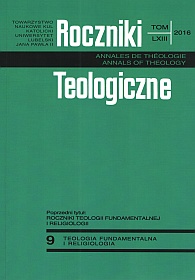Theology Of God’s Mercy according to Pope Francis’ Bull Misericordiae Vultus
Abstract
Pope Francis in the bull Misericordiae vultus encouraged to reflect on the meaning of God’s mercy in human history and the practice of Christian charity in life. According to the papal encouragement this article reflects on the content of the notion of God’s mercy. It focuses on these aspects which proved to be essential in the papal bull. The analyses performed are made from a theological perspective; they are therefore an attempt of interpretation, justification, and systematization of the content of the papal statements about mercy. They focus on three main themes present in the papal reflection: God’s mercy is being considered in trinitological, christological and ecclesiological aspects. Mercy comes from the inner life of the triune loving God. Addressed to the man and the world the love of God is experienced in the history of salvation as mercy remedying the deepest needs of the human being afflicted with sin. God’s mercy reached its full and perfect shape in the teaching and activity of Jesus Christ, especially in his cross and resurrection, which were ultimately the overcoming of human sin. God’s mercy lasts in the Church and reaches of the world through the Church. The Church is the more Christ’s, the more is the mercy of God. Teaching about God’s mercy, and above all the provision of charity to the needy is ‒ according to Pope Francis ‒ the criterion for the credibility of the Church towards the world.
References
Balthasar H.U. von, W pełni wiary, przeł. J. Fenrychowa, Kraków: Znak 1991.
Bartnik Cz.S., Chrystus – Syn Boga Żywego, Lublin: Standruk 2000.
Bartnik Cz.S., Dogmatyka katolicka, t. 1, Lublin: Wydawnictwo KUL 1999.
Congar Y., Chrystus i zbawienie świata, przeł. A. Turowiczowa, Kraków: Znak 1968.
Franciszek, Adhortacja apostolska o głoszeniu Ewangelii w dzisiejszym świecie Evangelii gaudium, Watykan 2013.
Franciszek, Bulla Misericordiae vultus, Watykan 2015.
Greshake G., Trójjedyny Bóg. Teologia trynitarna, przeł. J. Tyrawa, Wrocław: Wydawnictwo TUM 2009.
Jan Paweł II, Adhortacja apostolska Reconciliatio et paenitentia, Watykan 1984.
Jan Paweł II, Encyklika Dives in misericordia, Watykan 1980.
Jurczyk B., Potrójna rola kapłana w sakramencie pokuty, w: Sakrament pokuty wobec problemów współczesności, red. K. Glombik, Opole: Redakcja Wydawnictw Wydziału Teologicznego UO 2011, s. 217-238.
Katechizm Kościoła Katolickiego (1992). Tekst polski: Poznań: Pallottinum 1994.
Mühlen H., Die Veränderlichkeit Gottes als Horizont einer zukünftigen Christologie. Auf dem Wege zu einer Kreuzestheologie in Auseinandersetzung mit der altkirchlichen Christologie, Münster: Aschendorff 1969.
Müller G.L., Dogmatyka katolicka, przeł. W. Szymona, Kraków: Wydawnictwo WAM 2015.
Ratzinger J. – Benedykt XVI, Jezus z Nazaretu, cz. 2: Od wjazdu do Jerozolimy do Zmartwychwstania, przeł. W. Szymona, Kielce: Jedność 2011.
Ratzinger J., Wprowadzenie w chrześcijaństwo, przeł. Z. Włodkowa, Kraków: Znak 1970.
Schürmann H., Jesu ureigener Tod. Exegetische Besinnungen und Ausblick, Freiburg im Br.: Herder 19752, s. 137-143.
Sobór Watykański II, Dekret o misyjnej działalności Kościoła Ad gentes divinitus (1965). Tekst polski: Sobór Watykański II, Konstytucje. Dekrety. Deklaracje, Poznań: Pallottinum 2002, s. 433-471.
Stopnicki L., Miłosierdzie Boże w świetle Pisma Świętego i nasza na nie odpowiedź, w: „…bo Jego miłosierdzie na wieki” (Ps 135), red. T. Bielski, Poznań–Warszawa: Pallotinum 1972, s. 21-28.
Witczyk H., Pascha Jezusa odpowiedzią Boga na grzech świata. Eschatologiczna Ofiara Ekspiacji i nowego Przymierza, Lublin: Wydawnictwo KUL 2003.
Zyzak W., Miłosierdzie jako termin teologiczny, „Polonia Sacra” 2015, nr 1, s. 133-154.
Copyright (c) 2016 Roczniki Teologiczne

This work is licensed under a Creative Commons Attribution-NonCommercial-NoDerivatives 4.0 International License.





